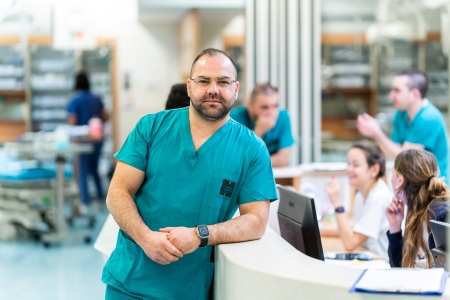
The following article was originally published in the Hadassah International 2022 Year In Review. To access the complete Hadassah International 2022 Year in Review – click here: Cure. Innovation. Humanity.
“Medicine is the only field which truly crosses all boundaries.” – Dr. Ahmad Nama, Director, Emergency Medicine, Hadassah Hospital Ein Kerem
Saving lives is a daily mission and despite full occupancy, the Emergency Room (ER) turns no one away. The daily routine in ER is characterized by a dramatic workload and high stress, with the potential for early burnout.
“Emergency Medicine is a challenging and complex specialty, where each day looks different from the next, and each patient has a completely different set of needs,” quietly discloses Dr. Ahmad Nama, the imposing Director of Emergency Medicine at Ein Kerem, succeeding Dr. Jacob (Kobi) Assaf. “Almost all patients who come to the ER arrive at their worst, suffering from pain and uncertainty, and requiring immediate assistance.” The medical team has to identify those patients with a time-critical condition and get them the immediate treatment they need. Using advanced diagnostics and therapeutics, patients admitted to the ER are triaged with a “fast track” deployed for patients exhibiting less severe conditions who can be treated quickly and released.
Fluent in four languages including Hungarian, and possessing a wealth of international experience, Nama radiates seriousness and calm but doesn’t mince words.
On a mission to improve and innovate, he expresses the need to introduce new technologies, refine medical protocols, and ultimately improve patient outcomes, experience, and care. Nama is pioneering a pain-free department. To alleviate patient suffering while reducing dependence on opioids, together with fellow ER doctors, he introduced the use of nerve blocks especially for the treatment of fractures – a technique he mastered during a fellowship in Australia.
His latest initiative is a new, cutting-edge, ER stroke unit to accelerate diagnosis for victims when every second counts for survival and recovery.
“We are in a university hospital aspiring to excellence on a daily basis,” Nama explains. Each doctor at the ER is actively encouraged to pursue a specialty that contributes to the range of medical expertise within the department. “The team at Ein Kerem is made up of outstanding professionals with huge hearts and a clear sense of mission. I feel privileged to work with them…As the new director, I feel a heavy responsibility to maintain the level of clinical excellence.” On technology in the ER, he adds, “It is important, but nothing can replace the human factor!”
For him, the path to emergency medicine was clear from a very young age. It’s where the minutes and seconds count. It’s where the diagnosis is critical. It’s where chaos can hit without warning. And the Ein Kerem ER has known many such moments. “The noises of the ER can be stressful. To me, they are a backdrop that doesn’t interfere but I am acutely aware of every change and discrepancy in the sounds.”
The population of Jerusalem is highly diverse, requiring sensitivity and understanding unlike that of any other city in the world. A marked rise in patients turning to ERs for emergency care following the COVID-19 pandemic, increased life expectancy in Israel, and the reality that many patients suffer from comorbidities, has led to a significant increase in ER admissions over the last five years.
On the Frontline at the Ukraine/Poland border

Drs. Ahmad Nama and Waseem Mujahed, both Hadassah Emergency Medicine experts, headed consecutive Hadassah medical mission teams sent to the Ukraine/Poland border to treat refugees in 2022, soon after the invasion began. Their teams were comprised of medical specialists, nurses, a logistics manager, and a medical clown.
Nama enhanced the Hadassah refugee clinic, jointly set up at the initiative of Hadassah International by Hadassah Medical Center and the Lublin Medical University Hospital.

Nama had an ultrasound machine flown in and established a patient registration protocol and a Hadassah medical supplies facility. “I collaborated with Lublin Medical University Hospital and trained their medical personnel to use innovative techniques such as administering nerve blocks,” he adds.
The two teams led by Nama and Mujahed treated some 100 patients per shift. They introduced the “fast track” protocol in all four Hadassah treatment centers, to provide efficient relief for patients with urgent conditions that could be treated quickly. Mujahed coordinated with other NGOs to streamline international relief efforts.
Dr. Mujahed recollects: “Even though we witnessed terrible scenes, it was a privilege to head a Hadassah Medical Mission team because we were able to bring relief to thousands of refugees in dire straits. Back in Ukraine, the refugees had already heard about the Hadassah refugee clinic. They came looking for us, ‘Where is the Hadassah clinic?’ they asked. And we turned no one away.”
Mujahed speaks their language having done his residency in the Ukraine. “The time spent treating refugees was challenging but immensely rewarding,” he admits. When I was asked to head the mission, I didn’t ask any questions. I was honored.”

